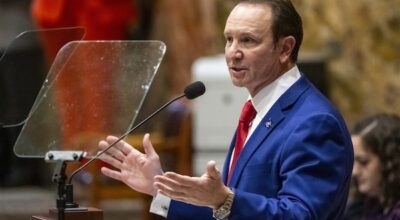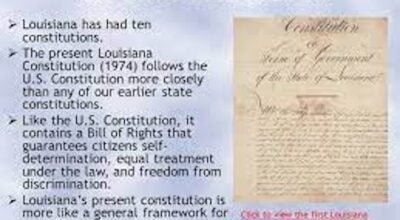Exemptions produce jobs, taxes
Published 6:50 pm Sunday, January 6, 2019
One of the major reasons for the economic boom being experienced in Southwest Louisiana is the state’s industrial tax exemption program (ITEP) that has recently come under fire in some quarters. Between 2006 and 2016, Calcasieu and Cameron parishes became locations for 54 percent of the industries receiving property tax exemptions.
Together Louisiana, one of the most vocal critics of the program, in a recent news release defended ITEP reforms made by Gov. John Bel Edwards. In doing so, the organization made up of civic and church groups took issue with the Louisiana Association of Business and Industry (LABI) that said the Edwards reforms were harming capital investments.
The organization in a news release said the statistics LABI claimed represented “the number of projects coming to Louisiana” actually were figures for the number of applications submitted for exemptions — a measure of requests for subsidies, in other words, not capital projects.
“In 2017, Louisiana attracted $25.6 billion in mobile capital investment, more than any other state this year,” according to a 2018 Investment Monitor report quoted by Together Louisiana. The report ranked Texas a distant second at $15.1 billion.
Those industries are creating thousands of construction and permanent jobs and are paying millions in state and local sales taxes on construction materials.
Before Edwards changed ITEP, local property tax exemptions were awarded by the state to prospective industries at 100 percent for five years with the possibility of a 5-year renewal. The Edwards reforms provide for an 80-percent property tax exemption for five years with the option to renew for five years at 80 percent.
Edwards also for the first time gave local governments a voice in whether they approved of the exemptions. They have 30 to 60 days to approve or reject them. The state Board of Commerce and Industry then reviews and approves or rejects the exemptions. The governor has the final word.
Even if prospective industries receive the exemptions, local governments will still get 20 percent of their property taxes from those companies.
The three local organizations involved in each parish are usually the police jury or parish council, the school board and the parish sheriff. In the case of Orleans Parish, it is the City Council that has that responsibility.
The Calcasieu Parish Police Jury, School Board and Calcasieu Parish Sheriff Tony Mancuso recently approved an exemption for the $15.9 billion Driftwood LNG project. The company qualified for a 100 percent exemption under the former ITEP rules because it had filed its application earlier.
Don Pierson, secretary of the Louisiana Economic Development (LED) department, said since 2016 economic development projects have resulted in more than $30.7 billion in capital investment in the state and generated 27,500 jobs. He said it also preserved 19,000 existing jobs, helped Louisiana reach a 10-year low unemployment rate during 2018 and employment reached record levels.
Driftwood’s Calcasieu Parish facility is expected to create 350 permanent jobs at salaries averaging more than $90,000 annually and 6,400 construction jobs. The company is also expected to pay $780 million in sales taxes. Its property will also go on the tax rolls when the exemption expires, and it will then pay millions in property taxes.
Within the next four years more than $14.5 billion of industry investments in Louisiana will come onto local property tax rolls. Those industries will become some of the biggest taxpayers in the parishes involved.
Wendy Aguillard, Calcasieu Parish tax assessor, recently provided state Sen. Dan “Blade” Morrish, R-Jennings, with a list of the parish’s 50 top property taxpayers. Here are the 20 largest and the amount of taxes they paid in 2017:
Entergy-Gulf States, $11.1 million; Phillips 66 Co., $9.7 million; Citgo Petroleum Corp., $9.6 million; Golden Nugget casino, $5.3 million; Sasol Chemicals (USA), $4.3 million; Eagle US 2 LLC, $4.1 million; Westlake Chemical, $3.3 million; Cameron Interstate Pipeline, $3.3 million; Lake Charles LNG, $3.2 million; PNK (Lake Charles) LLC, $3.2 million.
Also, Excel Paralubes, $2.8 million; Equistar Chemicals, $2.2 million; Boyd Racing, $2.1 million; Kinder Morgan Co., $2.0 million; RS Cogen LLC, $1.7 million; Entergy Texas, $1.6 million; Louisiana Pigment, $1.6 million; Calcasieu Refining, $1.5 million; Indorama Ventures, $1.4 million; Golden Pass Pipeline, $1.4 million.
It is clear from this list and the other 30 property taxpayers that industrial manufacturing continues to be the largest segment of our region’s economy.
Gov. Edwards has said industries granted property tax exemptions will be closely monitored to ensure they deliver on their promises. If not, they could lose their exemptions.
If there has been a flaw in ITEP, that may be it. Local government agencies don’t have the capability to do the monitoring. That has to be the responsibility of Louisiana Economic Development, a state department.
Size it up anyway you want, but there is no question that the ITEP program has played a major role in helping Southwest Louisiana become the No. 1 economic development region in the country.
EXEMPTIONS PRODUCTIVE — The local roperty tax exemptions granted to industries in Southwest Louisiana have paid off in terms of record economic development.





